Three Languages of Politics – Arnold Kling
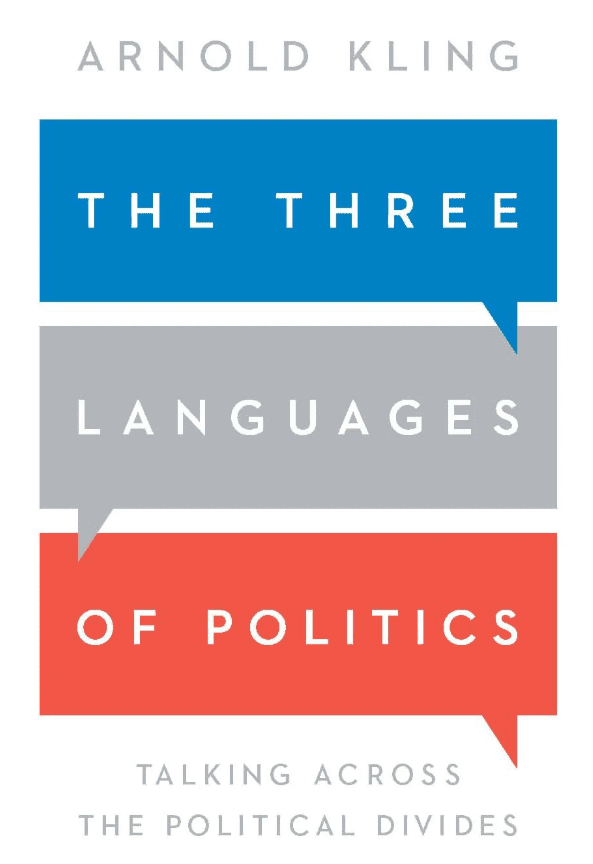
BOOK REVIEW: I just finished reading this book and here is #My2Cents
If like me, you think you have the most balanced political views, and everyone else is wrong … this book is helpful. It won’t bring about world peace, but it will give you a framework to process other folks’ views and hopefully move toward common ground.
You can download Arnold Kling's Book here in PDF format. If you want to compare and contrast my book, then you can download HappyGuide here in PDF format.
Here's my book report ... sorta like in the 10th grade. Maybe it will save you some time? Help you get the major points faster? Let’s give it a try.
POINT #1: 3 LANGUAGES & 3 COMMUNICATION AXIS
PAGE 17, the author writes:
The central claim of this book is that P is the language of progressives, C is the language of conservatives, and L is the language of libertarians.
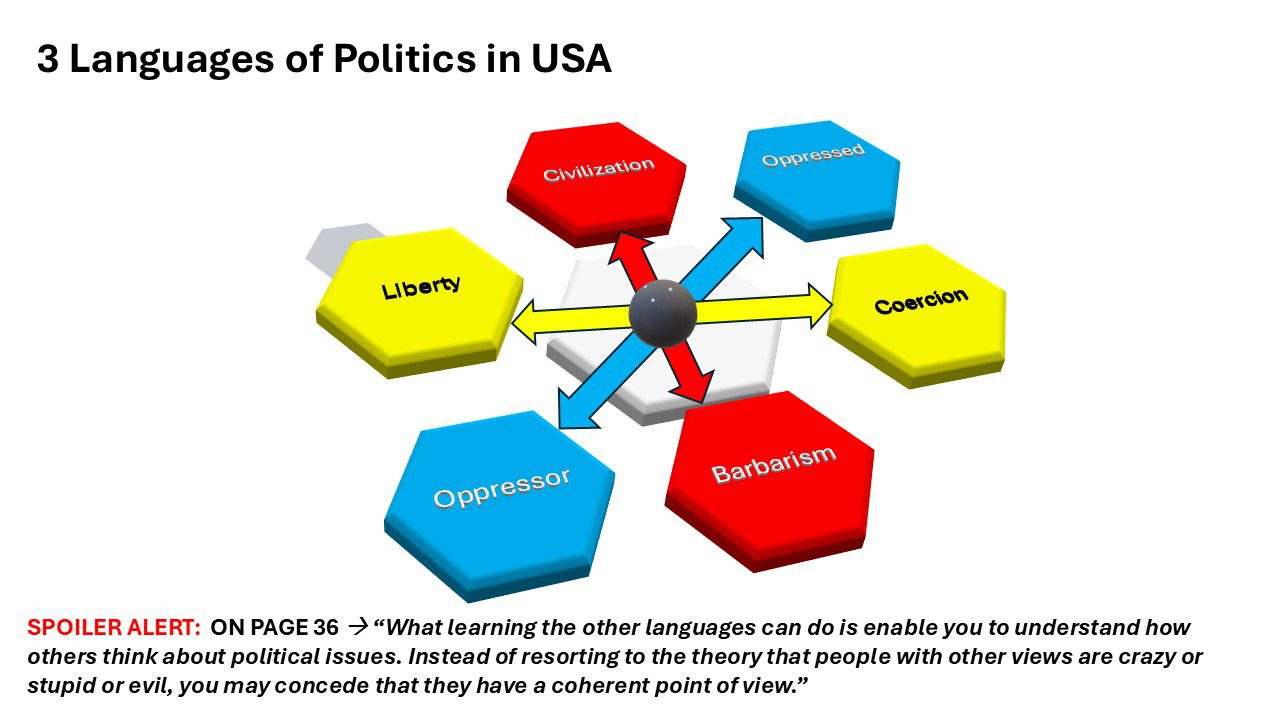
If the theory is correct, then someone who chooses P tends to identify with progressives, someone who chooses C tends to identify with conservatives, and someone who chooses L tends to identify with libertarians. I call this the three-axes model of political communication:
- A progressive will communicate along the oppressor/oppressed axis, framing issues in terms of the P dichotomy.
- A conservative will communicate along the civilization/barbarism axis, framing issues in terms of the C dichotomy.
- A libertarian will communicate along the liberty/coercion axis, framing issues in terms of the L dichotomy.
These 3 languages are embedded in tribalism and help each tribe survive/thrive against other tribes. No tribe understands the other tribes’ language.
POINT #2: POLITICAL PARTIES HAVE COMPLETELY DIFFERENT LANGUAGES (THINK RUSSIAN, SPANISH, AND AMERICAN)
On PAGE 77, this author submits:
Progressives believe in human betterment. They see nearly unlimited potential for humans to improve materially and, more important, morally.
Conservatives believe in human weakness. In biblical terms, man is “fallen.” The dark side of human nature will never be eradicated. It can be tamed only by social institutions, including the family, religion, and government.
Libertarians believe in human rationality. People pursue ends, and they act as they do for good reasons.
As an American society, very few of the political issues are black & white, simple, or without deserving fierce debate. All the easy problems were solved after the May Flower landed at Plymouth Rock.
The speaking "American" reference above was an attempt at humor sorta like renaming the Gulf of Mexico.
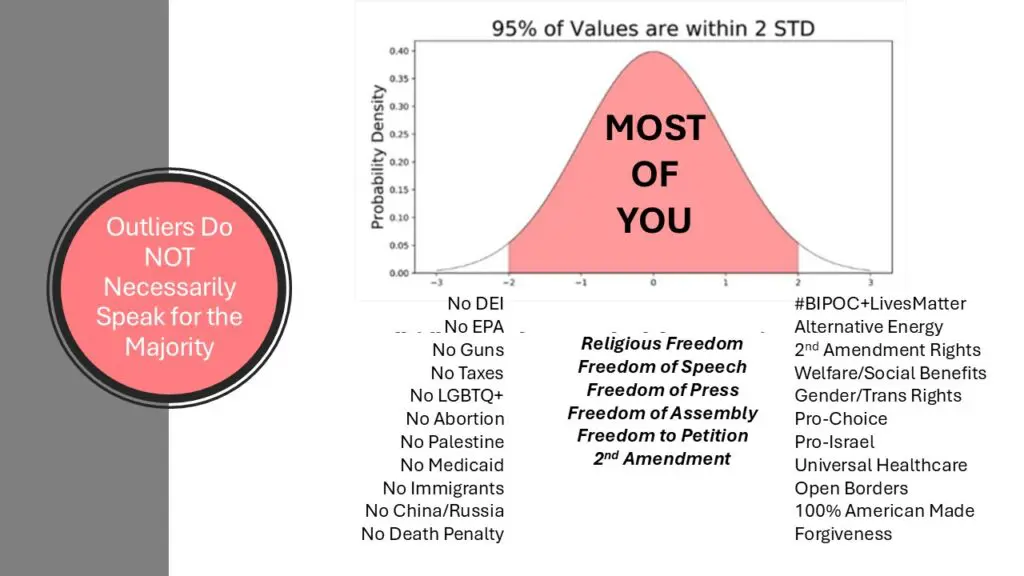
Now, almost every issue is framed with along a wide-continuum with host of nuanced complexities to be considered/re-considered as time marches on. Most Americans are in the silent majority.
They live their lives in the middle of America's pie. They aren't naturally polarized from their neighbors, friends, and co-workers. On most issues, most people are not outliers. That's math, not politics.
Overtime, issues ebb and flow. Somebody once said, "You never see the same river twice." meaning things are always flowing and changing and evolving. There is always something new to learn by watching carefully.
All the noise and name-calling usually comes from the crust of the pie ... on the outside edges.
POINT #3: EACH TRIBE IS CORRECT WHILE THE OTHER TRIBES ARE INCORRECT
PAGE 19, the author submits:
One might also think of the three axes as axes of demonization.
For example, when a progressive labels someone a racist, the progressive is putting that person on the oppressor end of the oppressor-oppressed axis. When a conservative labels someone a nihilist, the conservative is putting that person on the barbarism end of the civilization-barbarism axis. When a libertarian labels someone a statist, the libertarian is putting that person on the coercion end of the liberty-coercion axis.
The three axes allow each tribe to assert moral superiority.
The more an individual can speak its’ tribe language, the more status that person has in their tribe. The more an individual can use their tribe’s language the discredit another tribe, the more status that person has in their tribe. Thus the advent and multiplyiing of the political “bull shitter” influencers.
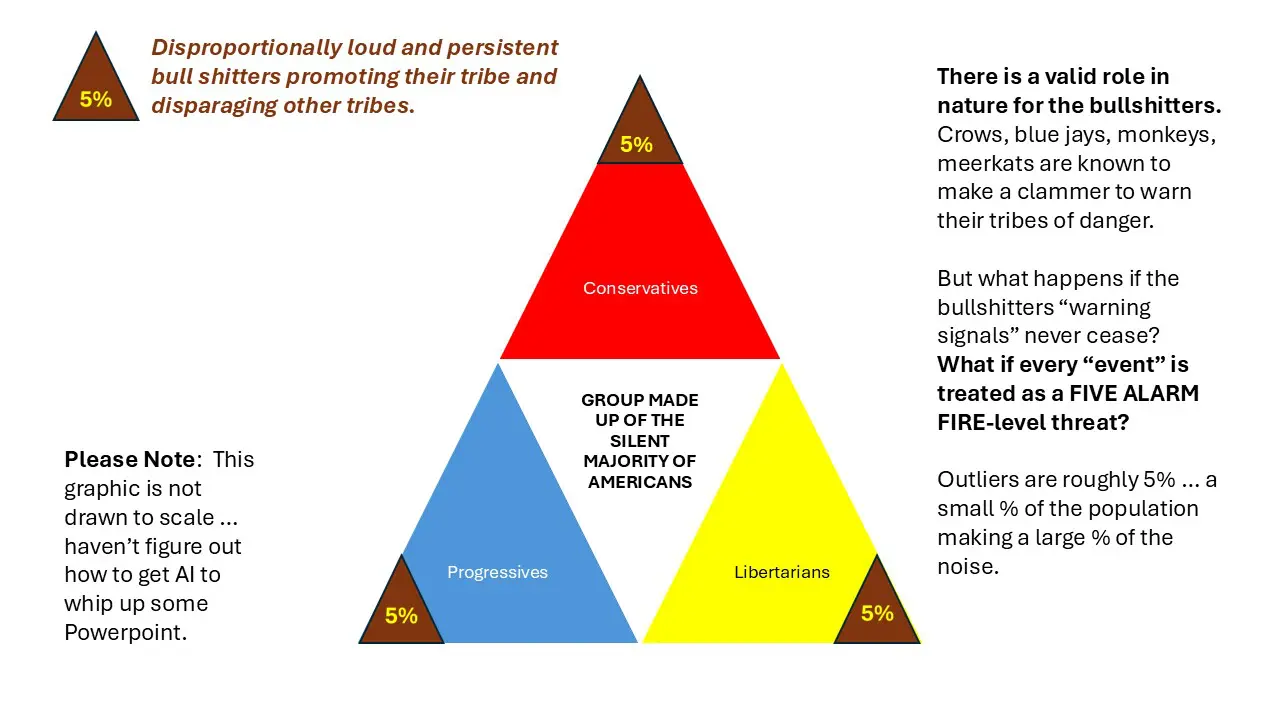
Frankly, I found the information above nicely packaged, it wasn’t particularly earth shaking. Where the book gets better is on a few points about “Now What?” Here’s the nuggets I dug up:
THOUGHT 1: DECENTERING TECHNIQUE GIVES YOU OPTIONS
Decentering is not about empathy—intuiting how others might be feeling. Rather, it is about intuiting what others are thinking. It is about imagining what is going through another person’s mind. It is about getting inside someone else’s head. . . . Being able to take someone else’s perspective lets people disagree without escalating into conflicts. Page 42
What I am suggesting here is that we treat differing ideologies as if they were languages to be understood rather than heresies to be stamped out. Perhaps your ultimate goal is to win people over to your ideology. But to use an oft-quoted phrase from Stephen Covey’s best-selling 1989 book The 7 Habits of Highly Effective People, “Seek first to understand, then to be understood.” Page 49

THOUGHT 2: SLOW THINKING MIGHT LEAD TO OPEN MINDED REASONING
I hope to encourage open-minded political reasoning, whereby we attempt to think like an impartial judge rather than an aggressive lawyer. With open-minded reasoning, you would apply an equal standard of rigor to evidence that supports or contradicts your previous views. Page 53
One of my prescriptions for slow political thinking is to try to avoid telling yourself, “I’m reasonable, they’re not.” Instead, I would suggest the following rule of thumb.
The only person you are qualified to pronounce unreasonable is yourself.
You are qualified to tell other people that they are wrong. You are just not qualified to tell other people that they are unreasonable. Only they can be the judge of that. PAGE 81
If we believe in individual freedoms, every person is entitled to dance to the beat of a different drummer ...

THOUGHT 3: REASONABLENESS MIGHT LEAD TO PROGRESS
The author submits:
One benefit of being able to understand all three languages of politics is that it becomes easier to recognize the reasonableness of the positions held by others. Those positions still may seem wrong, but it will be possible to understand where other people are coming from. PAGE 87
I believe that most difficult political issues are sufficiently complex that they cannot be understood fully using just one heuristic. If that is the case, then we probably will be much wiser if we can detach ourselves from our preferred language. In addition, treating people who use other heuristics as reasonable is likely to prove a less stressful and more productive way of approaching politics than treating the other heuristics as heresies that must be stamped out. PAGE 95

I don’t have all the facts, but this is what I believe … 95% of Americans are reasonable, hard-working, kind, respectful and loving human beings. While they might not agree with “precision” on many social, financial, or international issues, most Americans find themselves believing in democracy, charity, and service to others.
I got a ton of Trump-loving MAGA friends, and just as many bleeding liberals. I am sorta stuck in the middle in a quasi-tri-lingual no-man’s land (recognizing that I should have typed “no-person’s” land). I'm a fiscal conservative, socially liberal, and my individual freedoms should start & end at the tip of my nose.
Personally, I hate waste, bullies, and government overreach. I accept that politics can be hyprocritcal, contridictory, dishonest, illogical, and unfair. Welcome to an imperfect world, nation, and humans. Thank goodness smarter people than me are running the nation.
Here is what I know. Global military conflict, economic disparity, and the environment demand that we work together to find the “optimal” solutions for peace, prosperity, and happy living. So, bon jour, dzien dobry, hola, and good day mate! Let’s go to work!
Here’s today’s vid-clip:
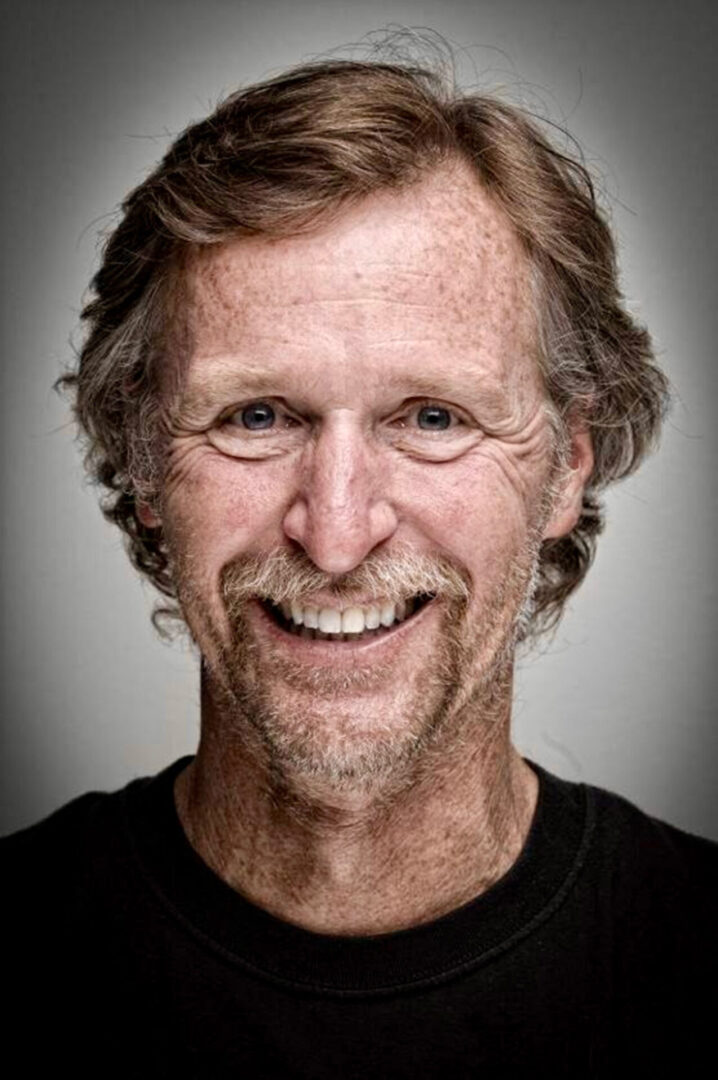
Tony McLean Brown
A Western NC hillbilly through and through, Tony McLean Brown was born in the small town of Enka-Candler outside of Asheville. His parents re-named him when he was 3 years old to Tony (a nickname provided by his grandfather) McLean (middle name of his Uncle Michael) while retaining his legal surname Brown.
Throughout his career, Tony McLean Brown worked as a farmer, computer programmer, and management consultant – in his adventurous years – author, song-writer, bass player, poet, pilot, mountaineer, certified scuba diver, and competitor in professional bull riding, NASCAR late model racing, Toughman boxing, Crossfit Open, Ironman, pole vaulting, marathon and ultra-marathon running, as well as parenting.
www.HappyGuidetoaShortLife.com has been leveraged to help charities and non-profits across the globe, USA, NC, and Lake Norman area. If you, your family, school, church, or charity has been supported, please take the time to share, like, subscribe, comment, and provide a 5 star review!

